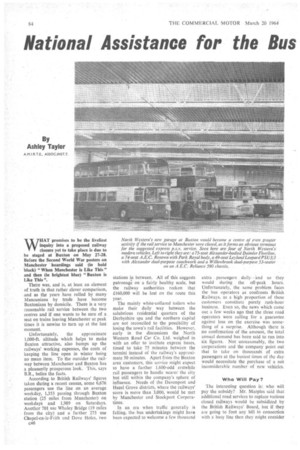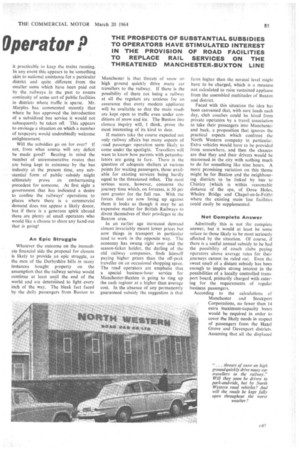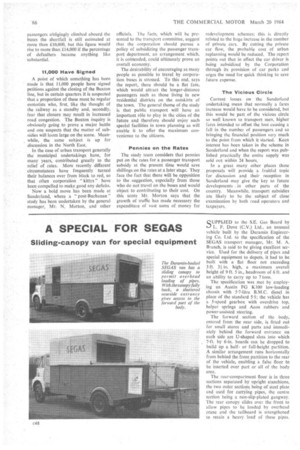National Assistance for the Bus
Page 86

Page 87

Page 88

If you've noticed an error in this article please click here to report it so we can fix it.
Operator P
WHAT promises to he the liveliest inquiry into a proposed railway closure yet to take place is due to be staged at Buxton on May 27-28. Before the Second World War posters on Manchester ' hoardings said (in bold black) "When Manchester is Like This" and then (in brightest blue) "Buxton is Like This
There was, and is, at least an element of truth in that rather clever comparison, and as th.e years have rolled by many Mancunians by trade have become Buxtonians by domicile. There is a very reasonable rail service between the two centres and if one wants to be sure of a seat on trains leaving Manchester at peak times it is unwise to turn up at the last moment.
Unfortunately, the approximate 1,000-ft. altitude which helps to make Buxton attractive, also bumps up the railways' working expenses, the costs of keeping the line open in winter being no mean item. To the outsider the railway between Manchester and Buxton has a pleasantly prosperous look. This, says B.R., belies the facts.
According to British Railways' figures taken during a recent census, some 6,676 passengers use the line on an average weekday, 1,353 passing through Buxton station (25 miles from Manchester) on weekdays and 1,989 on Saturdays. Another 701 use Whaley Bridge (19 miles from the city) and a further 275 use Chapel-en-le-Frith and Dove Holes, two c46 stations in between. All of this suggests patronage on a fairly healthy scale, bet the railway authorities reckon that £160,000 will be lost on the route this year.
The mainly white-collared toilers who make their daily way between the salubrious residential quarters of the Derbyshire spa and the northern Capital are not reconciled to the possibility of losing the town's rail facilities. However, early in the discussions the North Western Road Car Co. Ltd. weighed in with an offer to institute express buses, timed to take 75 minutes between the termini instead of the railway's approximate 50 minutes. Apart from the Buxton area customers, this service might expect to have a further 1,600-odd erstwhile rail passengers to handle nearer the city but still within the company's sphere of influence. Needs of the Davenport and Hazel Grove districts, where the railways' score is more than 3,000, would be met by Manchester and Stockport Corporations.
In an era when traffic generally is falling, the bus undertakings might have been expected to welcome a few thousand extra passengers daily—'and so they would during the off-peak hours. Unfortunately, the same problem faces the bus operators as confronts British Railways, as a high proportion of these customers constitute purely rush-hour business. Even so, the news which came out a few weeks ago that the three road operators were calling for a guarantee against loss on the exercise was something of a surprise. Although there is no confirmation of the amount, the total annual demand has been said to run into six figures. Not unreasonably, the two corporations and the company point out that to take on thousands of extra passengers at the busiest times of the day would necessitate the purchase of a not inconsiderable number of new vehicles.
Who Will Pay?
The interesting question is: who will pay the subsidy? Mr. Marples said that additional road services to replace various closed railways would be subsidized by the British Railways' Board, but if they are going to foot any bill in connection with a busy line then they might consider it practicable to keep the trains running. In any event this appears to be something akin to national assistance for a particular district and quite different from the smaller sums which have been paid out by the railways in the past to ensure continuity of some sort of public facilities in districts where traffic is sparse. Mr. Marples has commented recently that where he has approved the introduction of a subsidized bus service it would not subsequently be taken off. This appears to envisage a situation on which a number of taxpayers would undoubtedly welcome enlightenment.
Will the subsidies go on for ever? If not, from what source will any deficit be made good? Bearing in mind the number of unremunerative routes that are being kept in existence by the bus industry at the present time, any substantial form of public subsidy might ultimately prove an embarrassing precedent for someone. At first sight a government that has indicated a desire to confine the railways' operations to places where there is a commercial demand does not appear a likely donor, but if there is a generous spirit abroad there are plenty of small operators who would like a chance to share any hand-out that is going!
An Epic Struggle Whatever the outcome on the immediate financial side the proposal for closure is likely to provide an epic struggle, as the men of the Derbyshire hills in many instances bought property on the assumption that the railway service would continue at least until the end of the world and are deterniined to fight every inch of the way. The bleak fact faced by the daily passengers from Buxton to Manchester is that threats of snow on high ground quickly drive many car travellers to the railway. If there is the possibility of there not being a railway at all the regulars are anxious for an assurance that every modern appliance will be available so that the main roads are kept open to traffic even under conditions of snow and ice. The Buxton line closure inquiry will, I think, prove the most interesting of its kind to date.
If matters take the course expected not only railway affairs but many aspects of road passenger operation seem likely to come under the spotlight. Travellers will want to know how parents with perambulators are going to fare. There is the question of adequate shelters at various points for waiting passengers, those available for existing services being hardly equal to the threatened influx. The most. serious score, however, concerns the journey time which, on forecast, is 50 per cent greater for the full run. With the forces that are now lining up against them it looks as though it may be an expensive matter for British Railways to divest themselves of their privileges in the Buxton area.
In an earlier age increased demand almost invariably meant lower prices but now things in transport in particular tend to work in the opposite way. The economy has swung right over and the season-ticket holder, the darling of the old railway companies, finds himself paying higher prices than the off-peak traveller on an occasional shopping spree. The road operators are emphatic that a special business-hour service for Manchester-Buxton is going to ring up the cash register at a higher than average cost. In the absence of any permanently guaranteed subsidy the suggestion is that fares higher than the normal level might have to be charged, which is a measure not calculated to raise sustained applause from the assembled multitudes of Buxton and district Faced with this situation the idea has been canvassed that, with sure loads each day, club coaches could be hired from private operators by a travel association to take their passengers into Manchester and back, a proposition that ignores the practical aspects which confront the North Western company in particular. Extra vehicles would have to be provided from somewhere, and then the chances are that they and their drivers would be marooned in the city with nothing much to do for something like nine hours. A more promising variation on this theme might be for Buxton and the neighbouring districts to be linked by bus to Chinley (which is within reasonable distance of the spa, of Dove Holes, Whaley Bridge and Chapel-en-le-Frith) where the existing main line facilities could easily be .supplemented.
Not .Complete Answer
Admittedly this is not the complete answer, but it would at least be some solace to those likely to be most seriously affected by the situation. Of course, if there is a useful annual subsidy to be had the possibility of coach clubs paying operators above average rates for their journeys cannot be ruled out. Even the sweet smell of a distant subsidy has been enough to inspire strong interest in the possibilities of a locally controlled transport board, primarily charged with catering for the requirements of regular business passengers.
According to the calculations of Manchester and Stockport Corporations, no fewer than 14 extra maximum-capacity buses would be required in order to cover the likely needs in respect of passengers from the Hazel Grove and Davenport districts. Assuming that all the displaced passengers obligingly climbed aboard the buses the shortfall is still estimated at more than £10,000, but this figure would rise to more than £14,000 if the percentage of defaulters became anything like substantial.
11,000 Have Signed A point of which something has been made is that 11,000 people have signed petitions against the closing of the Buxton line, but in certain quarters it is suspected that a proportion of these must be regular motorists who, first, like the thought of the railway as a standby and, secondly, fear that closure may result in increased road congestion. The Buxton inquiry is obviously going to prove a major battle and one suspects that the matter of subsidies will loom large on the scene. Meanwhile, the same subject is up for discussion in the North East, In the case of urban transport generally the municipal undertakings have, for many years, contributed greatly to the relief of rates. More recently different circumstances have frequently turned their balances over from black to red, so that often corporation " kittys " have been compelled to make good any deficits.
Now a bold move has been made at Sunderland, where a " post-Buchanan " study has been undertaken by the general manager, Mr. N. Morton, and other officials, The facts which will be presented to the transport committee, suggest that the corporation should pursue a policy of subsidizing the passenger transport department, an arrangement which, it is contended, could ultimately prove an overall economy.
The desirability of encouraging as many people as possible to travel by corporation buses is stressed. To this end, says the report, there should be a flat fare, which would attract the longer-distance passengers such as those living in new residential districts on the outskirts of the town. The general theme of the study is that public transport will have an important role to play in the cities of the future and therefore should enjoy such special facilities in town planning as will enable it to offer the maximum convenience to the citizens.
Pennies on the Rates The study team considers that pennies put on the rates for a passenger transport subsidy at the present time would save shillings on the rates at a later stage. They face the fact that there will be opposition to the suggestion, especially from those who do not travel on the buses and would object to contributing to their cost. On this score Mr. Morton says that the growth of traffic has made necessary the expenditure of vast sums of money for redevelopment schemes: this is directly related to the huge increase in the number of private cars. By cutting the private car flow, the probable cost of urban replanning would be reduced. The report points Out that in effect the car driver is being subsidized by the Corporation through its provision of car parks and urges the need for quick thinking to save future expense.
The Vicious Circle
Current losses on the Sunderland undertaking mean that normally a fares increase would have to be considered, but this would he part of the vicious circle so well known to transport men, higher fares intended to offset the loss causing a fail in the number of passengers and so bringing the financial position very much to the point from which it started. Keen interest has been taken in the scheme in Sunderland and when the report was .published practically the entire supply was sold out within 24 hours.
In a great many other places these proposals will provide a fruitful topic for discussion and their reception in Sunderland may give the key to future developments . in other parts of the country. Meanwhile, transport subsidies are likely to be the subject of close' -examination by both road operators and taxpayers.
















































































































































